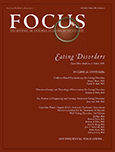Clinical Psychopharmacology of Eating Disorders: A Research Update
Abstract
The paper presents a critical review (with search date 2010) of the major psychotropic medications assessed in eating disorders, namely antipsychotics, antidepressants, mood-stabilizing medications, anxiolytic and other agents. The evidence of efficacy of drug treatments is mostly weak or moderate. In addition, attrition rates are usually higher than for psychotherapies. However, there is support for use of antidepressants, particularly high-dose fluoxetine in bulimia nervosa, and anticonvulsants (topiramate) for binge-eating disorder. Low-dose antipsychotic medication may be clinically useful as adjunct treatment in acute anorexia, particularly where there is high anxiety and obsessive eating-related ruminations and failure to engage, but more trials are needed. Drug therapies such as topiramate and anti-obesity medication may aid weight loss in obese or overweight patients with binge-eating disorder; however, common or potentially serious adverse effects limit their use.
(Reprinted with permission from the International Journal of Neuropsychopharmacology 2012; 15:209–222)



